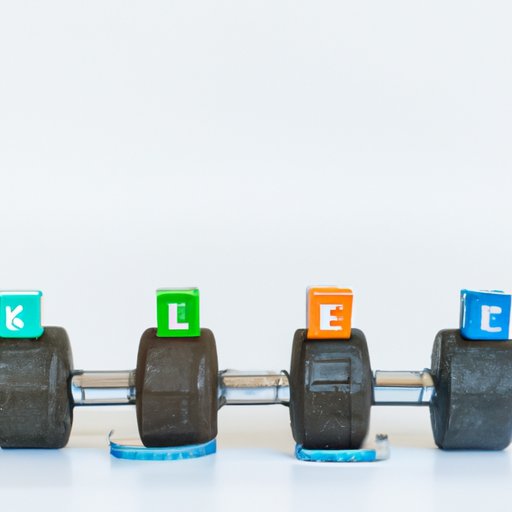
Does Gaining Muscle Make You Gain Weight?
Many people who are interested in building muscle often worry about gaining weight. The common misconception is that muscle gain automatically leads to weight gain. While it is true that muscle growth can add pounds to your body, it doesn’t necessarily mean you’re gaining fat. This article will explore the relationship between muscle gain and weight gain, debunk common myths, provide practical tips for building muscle without adding extra weight, and explain the health benefits of muscle gain.
The Relationship Between Muscle Gain and Weight Gain: Exploring the Science Behind It
In order to understand the relationship between muscle gain and weight gain, it’s important to first explore how muscle growth occurs. Muscle growth happens when the muscle is put under stress, usually through resistance training exercises like weight-lifting or body-weight exercises. When the muscle is stressed, small tears occur in the muscle fibers, which lead to inflammation and soreness. The body then repairs these tears, often making the muscle bigger and stronger.
While this process of muscle growth can lead to weight gain, it’s important to note that muscle and fat are not the same. Muscle tissue is denser and more compact than fat tissue, which means it takes up less space in the body. This is why someone who is the same weight as another person, but has more muscle mass, may appear leaner and more toned.
Debunking the Myth: Why Gaining Muscle Won’t Necessarily Make You Gain Weight
One of the most common myths surrounding muscle gain is that building muscle automatically leads to weight gain. However, this isn’t necessarily true. In fact, some studies have shown that muscle gain can actually lead to weight loss in some cases.
The reason for this is simple: muscle tissue requires more energy to maintain than fat tissue. This means that having more muscle mass can actually increase your resting metabolic rate, which is the amount of energy your body burns at rest. This increased metabolic rate can lead to greater weight loss and improved body composition over time.
The Ultimate Guide to Building Muscles Without Packing on Extra Pounds
If you’re looking to build muscle without adding extra weight, there are a few key strategies you should keep in mind. First, focus on compound exercises that target multiple muscle groups, such as squats, deadlifts, and pull-ups. These exercises will help you build muscle mass more efficiently, without adding extra weight.
It’s also important to pay attention to your nutrition. In order to build muscle, your body needs a steady supply of protein to repair and grow muscle tissue. Aim to consume around 0.8-1 gram of protein per pound of bodyweight per day. In addition to protein, you’ll also need to consume enough carbohydrates to fuel your workouts and support muscle growth. Finally, make sure you’re getting enough rest and recovery time to allow your muscles to repair and grow.
The Role of Diet and Exercise in Building Muscle and Controlling Your Weight
In addition to paying attention to your nutrition and workout routine, it’s important to understand how diet and exercise work together to help you build muscle and maintain a healthy weight. Resistance training exercises, such as weight-lifting and body-weight exercises, are essential for building muscle mass. But in order to truly optimize your results, you’ll also need to focus on nutrition.
For muscle gain, it’s important to consume enough protein to provide your body with the building blocks it needs to repair and grow muscle tissue. In addition to protein, you’ll also want to consume enough carbohydrates to fuel your workouts and support muscle growth. Generally speaking, a diet that’s high in protein, moderate in carbohydrates, and low in fat is ideal for muscle gain and weight management.
The Health Benefits of Muscle Gain: Why You Should Focus on Building Lean Muscles Instead of Worrying About the Scale
While many people focus solely on weight loss as a measure of health, it’s important to understand the many benefits of building lean muscle mass. In addition to improving your body composition, building muscle can also lead to increased strength, greater endurance, and improved overall health.
Having more muscle mass can also improve your metabolism, as muscle tissue requires more energy to maintain than fat tissue. This means that having more muscle can help you burn more calories throughout the day, even when you’re not exercising. Additionally, having more muscle mass can help improve your balance, coordination, and overall mobility as you age.

How to Measure Your Body Composition: Understanding the Difference Between Muscle Mass vs. Body Fat
In order to truly understand your body composition and track changes over time, you’ll need to measure your muscle mass and body fat. There are a few different methods for doing this, including bioelectrical impedance analysis, hydrostatic weighing, and DEXA scans. While each of these methods has its pros and cons, they all provide a more accurate picture of your body composition than simply measuring your weight.
It’s important to understand the difference between muscle mass and body fat, as these two metrics play very different roles in your overall health. While having more muscle mass can lead to increased strength, power, and metabolism, having too much body fat can increase your risk for a number of health problems, including heart disease, diabetes, and cancer.
Conclusion: Tips for Building Lean Muscle Without Adding Extra Weight
In conclusion, building muscle doesn’t necessarily mean gaining weight. By understanding the science behind muscle growth, focusing on the right exercises and nutrition strategies, and measuring your body composition accurately, you can build lean muscle mass and improve your overall health without adding extra pounds.
To build lean muscle without adding extra weight, it’s important to focus on compound exercises, consume enough protein and carbohydrates, and get enough rest and recovery time. It’s also important to track your body composition over time, and aim for a body composition that’s high in muscle mass and low in body fat.





